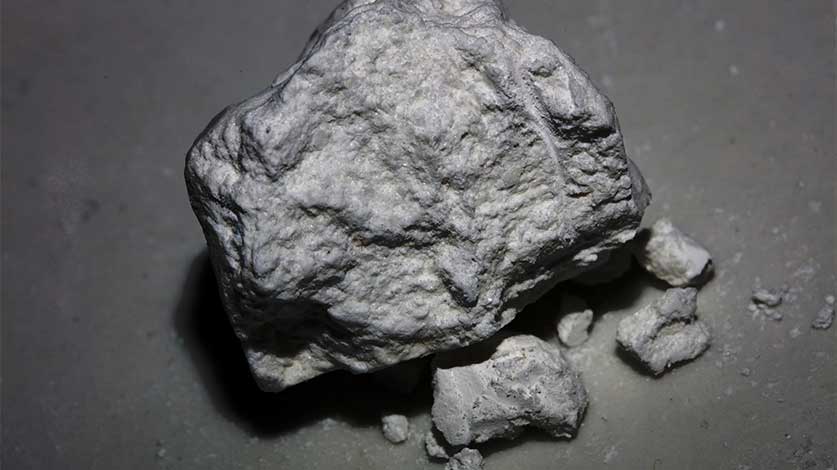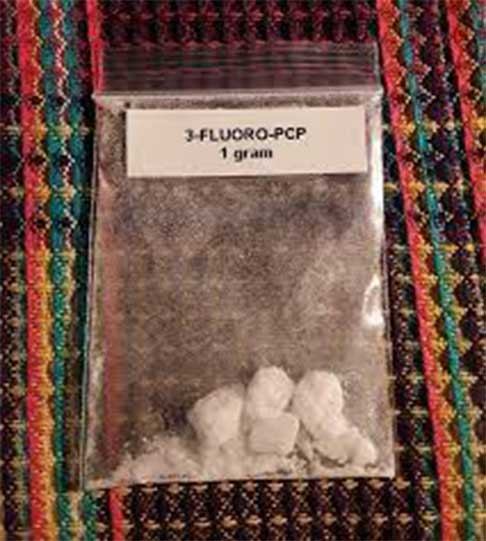3-Fluoro PCP (hydrochloride) | Overview & Dangers

Medically Reviewed By: Manish Mishra, MBBS
In recent years, many Ohioans have started abusing new psychoactive substances (NPS). These human-made substances are designed to mimic the effects of popular illegal drugs. One of the newest NPS is called 3-fluoro-PCP, which mimics the effects of PCP. It poses serious health risks, including addiction.

While many Ohioans abuse well-known drugs like heroin and cocaine, others have started abusing new psychoactive substances (NPS). These relatively unknown substances are designed to mimic the effects of popular illegal drugs.
One of the newest NPS on Ohio’s drug market is a dissociative drug 3-fluoro-PCP (hydrochloride). Like other dissociative drugs, it can cause serious health problems.
What Is 3-Fluoro-PCP?
3-fluoro-PCP is a chemical compound that belongs to a class of drugs called arylcyclohexylamines. It was first discovered in October 2020. Like other NPS, it has multiple names and identifiers, including:
- 3-fluoro phencyclidine
- 3′-F-PCP, 3F-PCP
- 1-[1-(3-fluorophenyl)cyclohexyl]-piperidine, monohydrochloride
The drug comes in two formulations: a crystalline solid and a white powder.

It’s considered a phencyclidine derivative or analog. That means it’s chemically similar to the psychedelic drug phencyclidine (PCP). Other phencyclidine derivatives include 3-Methyl-PCP, 3-HO-PCP, and 4-Keto-PCP.
Effects Of 3-Fluoro-PCP
Because 3-fluoro-PCP is so new, there have been very few studies on its effects. However, according to user reports, its effects are similar to the effects of PCP and other dissociative drugs (such as ketamine and dextromethorphan).
These drugs make you feel detached from your body and surroundings. Other effects may include:
- euphoria (intense joy)
- altered sense of time
- reduced pain
- increased energy
- faster breathing and heart rate
- high blood pressure
- increased body temperature
- anxiety
- panic
- numbness
- dizziness
- slurred speech
- involuntary eye movements
- nausea and vomiting
- loss of coordination
Psychosis
As a psychedelic drug, 3-fluoro-PCP may cause symptoms of psychosis. Psychosis is a temporary loss of connection from reality. Common symptoms include:
- paranoia (feeling irrationally suspicious of others)
- delusions (holding beliefs that conflict with reality)
- hallucinations (seeing, hearing, or feeling things that aren’t there)
Dangers Of 3-Fluoro-PCP
Because 3-fluoro-PCP is derived from PCP, it likely poses similar dangers. Taking very high doses of PCP can make you aggressive and violent. It can also cause irregular heartbeat, rigid muscles, seizures, kidney failure, and even death.
Also, long-term use of PCP and its derivatives may increase your risk of cognitive problems like memory loss, trouble thinking, and trouble speaking.
It may also cause mental health concerns such as anxiety, depression, and suicidal thoughts. These effects may last for a year or more after you stop using the drug.
Is 3-Fluoro-PCP Addictive?
Researchers have not determined whether 3-fluoro-PCP is addictive. However, it likely is, as PCP poses a high risk of addiction with regular use. PCP addiction is a serious disease that makes you feel unable to stop using the drug.
The most common symptoms of PCP addiction are tolerance and physical dependence. Tolerance means you need increasingly higher or more frequent doses of a drug to feel the desired effects.
Physical dependence means your body starts relying on a drug to function normally. If you stop using it, you may experience withdrawal symptoms. Common withdrawal symptoms associated with PCP addiction include:
- drug cravings
- anxiety
- irritability
- headache
- sweating
Along with physical dependence and tolerance, other symptoms of addiction may include:
- loss of motivation
- loss of interest in activities once enjoyed
- avoidance of family and friends
- mood swings
- trouble concentrating
Like other diseases, addiction requires professional treatment.
Treatment Options For 3-Fluoro-PCP Addiction
If you or someone you love shows signs of 3-fluoro-PCP addiction, seek help at a substance abuse treatment program.
When you enter the program, a team of healthcare providers will evaluate your situation and create your personalized treatment plan. Depending on your needs, this plan may include services such as:
- medical detox, in which doctors will help you manage withdrawal symptoms as you stop using drugs
- mental health counseling, in which a therapist will help you manage drug cravings and any mental health concerns that may have led you to abuse drugs in the first place
- support groups, in which you can share your experiences with other people recovering from addiction
To learn more about addiction treatment options, please reach out to Ohio Recovery Center. Our inpatient treatment programs offer comprehensive, evidence-based care to help you or your loved one stay drug-free.
- Journal of Pharmacology and Experimental Therapeutics — Structure-activity relationship studies of phencyclidine derivatives in rats https://pubmed.ncbi.nlm.nih.gov/6694098/
- National Forensic Laboratory — ANALYTICAL REPORT: 3F-PCP (C17H24FN) https://www.policija.si/apps/nfl_response_web/0_Analytical_Reports_final/3F-PCP-ID-2186-20_report.pdf
- National Institute on Drug Abuse — What Are the Effects of Common Dissociative Drugs on the Brain and Body? https://nida.nih.gov/publications/research-reports/hallucinogens-dissociative-drugs/what-are-effects-common-dissociative-drugs-brain-body
- National Library of Medicine: MedlinePlus — Substance use - phencyclidine (PCP) https://medlineplus.gov/ency/patientinstructions/000797.htm

